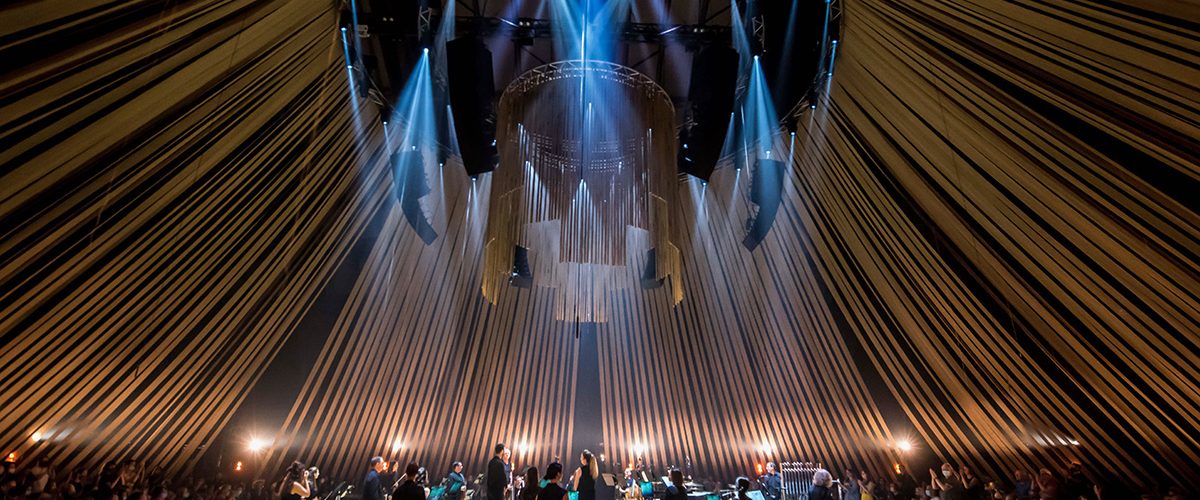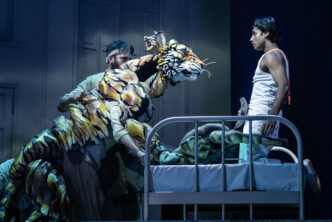I couldn’t swear that the The Patience of Trees is the best thing at this year’s Manchester International Festival; I haven’t seen everything on offer. But, as an event, it has that necessary sprinkling of magic that will make it the experience I recall whenever I think back on MIF21.
Curated and in part composed by British Bulgarian, Dobrinka Tabakova, “The Patience of Trees,” blessed with Amanda Stoodley’s striking set, transcends being a concert of contemporary classical music – though that would have been enough.
The audience, socially-distanced and bemasked, sit in the round facing a stage that clearly references the rings of the trunk of an enormous tree. Are we in a tent or a clearing in some forest or jungle? Bamboo tubes hang like a chandelier in some organic cathedral. The players of the Manchester Camerata, enter from all sides, slowly, ceremoniously, their leader and conductor, Hugo Ticciati to the fore. The strings players scrape delicately at their instruments like approaching insects of the forest or perhaps some secret tribe.

It is one of the unexpected boons of the computer tablet age that, with scores displayed on a subtly illuminated screen, the range of lighting effects available expands. Thus freed, Andy Purves’s lighting display varies from brightly lit to shafts and intermeshed bars of light to subdued and shadowy, as if we are indeed witnessing some ritual, deep in the heart of a forest.
Tabakova brings together five pieces, three having world premieres in this performance. They are played without interval (75 minutes’ duration) as though they are five movements of a whole and, for the most part, they fit as a single entity.
We open with Tabakova’s titular piece, commissioned by MIF and played here in public for the first time. In essence, it is a violin concerto written for Ticciati and he does not undervalue it in the playing. Composed in four sections, representing the elements – Earth, Water, Fire, Air – the central motif, in Tabakova’s words ‘the tree theme,’ repeats and endures. Her aspiration was to reconnect us with nature, even as we remain isolated one from another. It is both grounding and spirit-lifting; a delicious and transporting piece.
We ease without pause into Steve Reich’s “New York Counterpoint.’ This features a prerecorded tape made by the soloist – ten clarinet and bass clarinet parts – played back as the soloist plays live ‘against the tape.’ It is always good to hear Reich’s work yet, somehow, this piece does not sit so easily in programme. Even the soloist herself comes click-clacking to the stage on heels; out of harmony with the hesitant, soft shoe shuffle of the Camerata’s entrances and exits. What we get is not a ‘monstrous carbuncle’ just an interesting construction that is not quite at home in this particular sensitively built environment.
A world premiere for Paul Saggers’s “Vulpes Vulpes” follows – three elements of the life of a fox: from urban cub to hunted beast. Lively and percussive, injecting energy as it goes.
The final premiere of the evening is “Todo Era Vuelo en Nuestra Tierra” (“Everything was Flight on Our Land”) by Julieta Szewach. Striking chords and percussion singing of the tension between our humanity and the city lives we create. Ticciati solos and circles the auditorium, like the Pied Piper whom none will follow, drawing our eyes and ears out into the darkness beyond. Enchanting.
The evening closes with Tabakova’s beautiful piece for oboe and percussion, “Frozen River Flows.” She describes it as a ‘short delicate meditation’ and, as such, it brings a perfect serene closure to our journey.
Almost as if wondering if it is permitted to rise from our seats, members of the audience look, uncertainly about them. Then, a prolonged standing ovation, that leaves the players smiling with delight. Rightly so. Magical.
The Patience of Trees was reviewed at MIF 2021 on 16 July. The performance is also available to watch digitally on demand.





